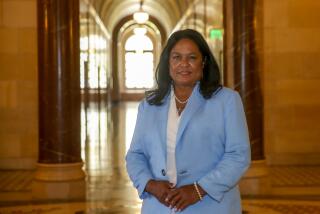Bringing Government to South L.A.
- Share via
On Monday, Los Angeles City Councilman Mark Ridley-Thomas opened his new district office in an old bank building on Vermont Avenue in South-Central L.A.
It was a small but important event in the continuing story of a poor part of town where blacks and Latinos are suffering more than most from the stresses and strains of living in late 20th Century urban America.
When Ridley-Thomas campaigned for the council earlier this year, he had promised a “mini-City Hall” for the district, so residents wouldn’t have to travel downtown to talk to building inspectors and other purveyors of city services.
What he delivered--offices in a building just north of Manchester Avenue--wasn’t exactly City Hall. But at a cost of $180,000, city crews had built a series of work spaces for Building and Safety, Water and Power, the Police and Fire departments, the Community Redevelopment Agency and a few other city service agencies. “People will see city government will work for them in a direct and tangible way and they will see they have elected someone who keeps his word,” Ridley-Thomas told me.
I dropped by the office opening as part of a long-running pursuit of one of the city’s most important stories--survival amid racial tension and economic decay, in a community where African-Americans, Latino immigrants and Korean-born merchants are thrown together 24 hours a day, seven days a week in a sometimes tense atmosphere.
It exploded after a Korean-born grocer shot and killed Latasha Harlins, a 15-year-old African-American. The killing was followed by protests by black community members, led by Danny Bakewell, a well-known black leader. The protests got even hotter when Superior Court Judge Joyce Karlins ordered probation--but no jail time--for the grocer, who had shot the unarmed girl during a fight over payment for a bottle of juice.
I criticized Bakewell last month. His speeches sounded anti-Korean. I thought he was edging close to racism and wrote that he was “preaching a no-win course, the politics of exclusion.”
Several African-American readers talked to me about the column. They said I didn’t understand the anger ignited in the black community by the Harlins slaying and the subsequent sentencing. The rage reflected a feeling, one man told me, that government had no regard for the black community. “That is why it (the rage) was so instantaneous, so widespread and so deep, and why it cut across class with African-Americans,” he said. Bakewell, my readers said, reflected that anger better than anyone else in town.
I replied that the best outlet for the anger was electoral politics. Some of my critics agreed with me. But others said that past electoral victories haven’t improved life in South L.A. Even the election of a black mayor, Tom Bradley, hadn’t stopped South L.A.’s decline.
Two of them said that I--a white guy preaching to the black community--didn’t know what I was talking about.
But the opening of Ridley-Thomas’ new office seemed to refute the idea that the election process doesn’t work.
When the campaign for the 8th District seat opened early this year, the district was in bad shape. City services had been neglected. The police beating of Rodney G. King had heated up the anger. Incidents between black residents and Korean merchants exacerbated racial tensions.
These matters were the essential part of the daily political debate between Ridley-Thomas and his three main opponents--Kerman Maddox, Billy Mills Jr. and Rod Wright. From January to May, in meetings in school auditoriums, private homes, in churches and community centers, hundreds of residents voiced their gripes.
Every day, often several times a day, the candidates had to confront these gripes. What about the trash in the alley? Or the noise and congestion at the Korean-owned swap meet? Or the cops who stopped my son on his way home from school?
In this campaign, at least, politics came to grips with real life.
On Monday, Ridley-Thomas provided tangible examples of his determination to translate campaign promises into government action.
Police officers met residents. In front of the office was a public works truck with a tall platform to repair the broken street lights that have long been part of the 8th District’s landscape. Animal control officers in pressed uniforms were around, evidence that stray dogs won’t be tolerated under the Ridley-Thomas regime.
City government, Ridley-Thomas said, has “subtle and not-so-subtle ways of communicating that it doesn’t value someone. One of these ways is not providing services.”
The months and years ahead will tell whether this was a small triumph of electoral politics or, as some of my more skeptical readers might predict, another example of politics’ broken promises.
More to Read
Sign up for Essential California
The most important California stories and recommendations in your inbox every morning.
You may occasionally receive promotional content from the Los Angeles Times.













